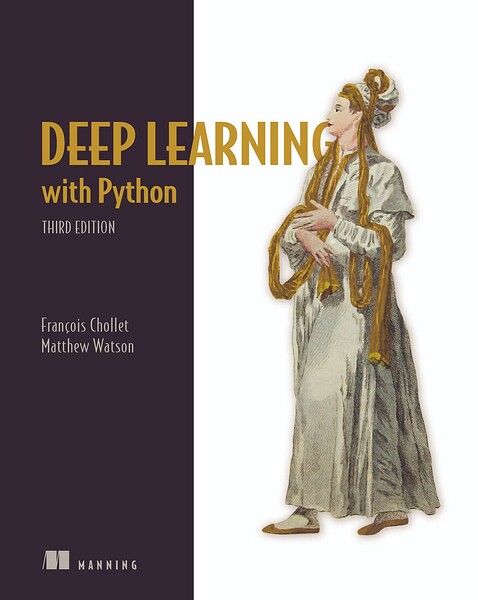ManningBooks
Deep Learning with Python, Third Edition (Manning)
The bestselling book on Python deep learning, now covering generative AI, Keras 3, PyTorch, and JAX!
François Chollet and Matthew Watson
Deep Learning with Python (Third Edition) by François Chollet and Matthew Watson (Manning Publications) provides an updated and comprehensive introduction to modern deep learning practices.
 Overview
Overview
This edition reflects the current state of deep learning as of 2024–2025. It expands on previous versions with new material, refreshed code, and broader framework coverage.
Key updates
-
Keras 3 and TensorFlow integration – updated examples aligned with the latest Keras and TensorFlow APIs.
-
Coverage of modern architectures – new chapters on transformers, large language models (LLMs), and diffusion-based generative models.
-
Multi-framework perspective – introduces PyTorch and JAX, helping readers compare workflows and performance across popular tools.
-
Expanded content – approximately 30% more material than the previous edition, including deeper coverage of real-world use cases and scaling.
-
Practical and conceptual balance – emphasizes conceptual understanding and clear explanations over complex mathematical derivations.
 Contents at a glance
Contents at a glance
The book follows a clear, incremental learning path:
-
Core principles – foundations of deep learning and mathematical basics.
-
Frameworks – using Keras, TensorFlow, PyTorch, and JAX for model development.
-
Applications – classification, regression, computer vision, and sequence modeling.
-
Text and language – natural language processing and transformer-based architectures.
-
Generative models – image and text generation, diffusion models, and LLMs.
-
Practical topics – tuning, scaling, and deploying deep learning systems.
-
Future perspectives – trends and research directions in AI.
 Intended audience
Intended audience
This book is suitable for:
-
Software developers and data practitioners with intermediate Python knowledge.
-
Engineers interested in learning deep learning through hands-on implementation.
-
Readers seeking a unified introduction to multiple frameworks and model families.
It is not intended as a purely theoretical text or as a comprehensive reference for advanced mathematical foundations.
 Learning recommendations
Learning recommendations
-
Work through the code examples as you read; most chapters include runnable snippets.
-
Compare the same models implemented in different frameworks for a deeper understanding.
-
Use the chapters on generative AI as a base for experimentation or small projects.
-
Engage in study groups or code reviews to discuss approaches and outcomes.
Deep Learning with Python, Third Edition serves as both an accessible starting point and an up-to-date reference for developers looking to understand or apply deep learning using current frameworks and techniques.
Don’t forget you can get 45% off with your Devtalk discount! Just use the coupon code “devtalk.com” at checkout ![]()
Most Liked
dyowee
I read halfway through first version of this a long time ago. Maybe it is time for me to read this version completely. ![]()
ManningBooks
Having in mind recent developments in the field, it definitely is! ![]()
dyowee
Thanks!
Popular Ai topics

Other popular topics

Categories:
Sub Categories:
Popular Portals
- /elixir
- /rust
- /wasm
- /ruby
- /erlang
- /phoenix
- /keyboards
- /python
- /js
- /rails
- /security
- /go
- /swift
- /vim
- /clojure
- /emacs
- /java
- /haskell
- /svelte
- /onivim
- /typescript
- /kotlin
- /c-plus-plus
- /crystal
- /tailwind
- /react
- /gleam
- /ocaml
- /elm
- /flutter
- /vscode
- /ash
- /html
- /opensuse
- /zig
- /centos
- /deepseek
- /php
- /scala
- /react-native
- /lisp
- /sublime-text
- /textmate
- /nixos
- /debian
- /agda
- /django
- /deno
- /kubuntu
- /arch-linux
- /nodejs
- /revery
- /ubuntu
- /spring
- /manjaro
- /lua
- /diversity
- /julia
- /markdown
- /slackware










